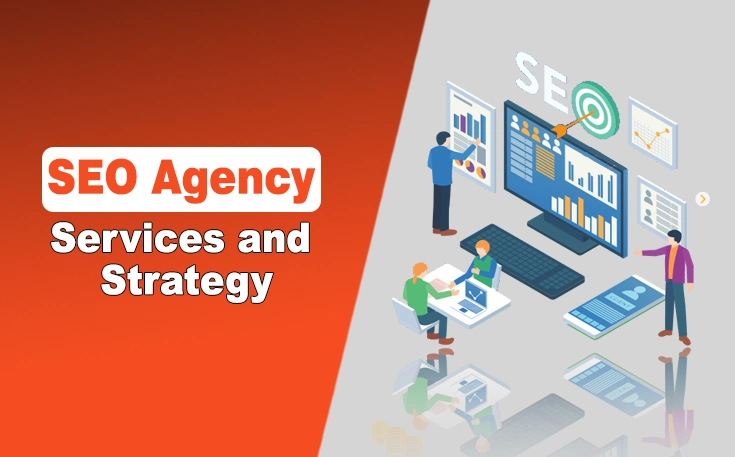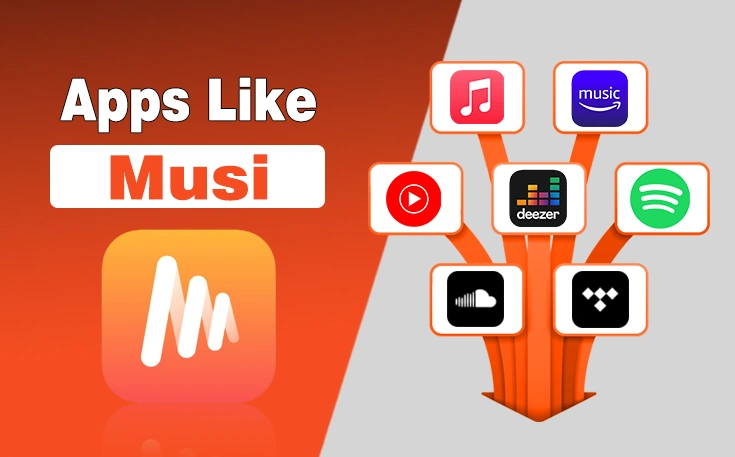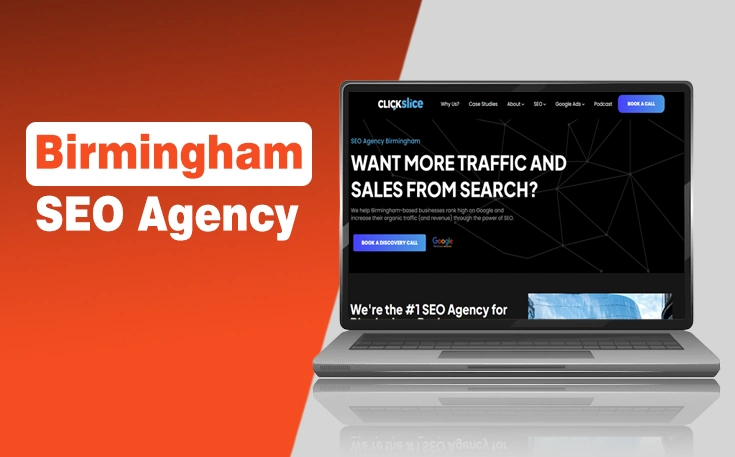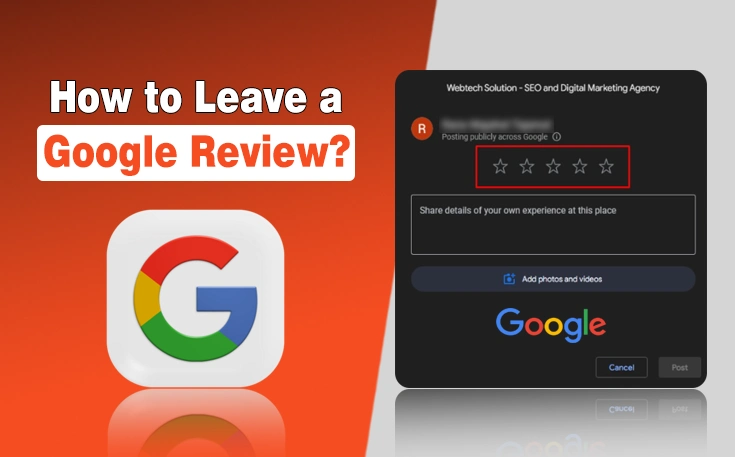You build a website, you publish content, and yet… nothing. That’s where an SEO agency comes in.
An SEO agency is a team of professionals who understand the ins and outs of how search engines work and how your website can be optimized to perform better on them.
According to statistics, 96.55% of content does not receive traffic from Google because it’s not properly optimized for search engines. So, how do you optimize your new blog? Do you know the tactics and strategies to rank your pages in SERP? Not sure! An SEO agency helps you in all these things to rank your pages in Google search to drive organic traffic.
So in this guide, what is an SEO agency, what does they do, their services and how an effective SEO strategy is built from scratch.
What is an SEO Agency?
An SEO agency is a company that helps businesses improve their visibility on search engines like Google, Bing, and Yahoo. Their job is to use a mix of technical, content-based, and promotional strategies to get your website ranked higher in search engine results pages (SERPs).
But more than just rankings, a good SEO agency focuses on driving qualified traffic that actually converts. Think of them as digital architects – they audit, build, optimize, and maintain your online structure to ensure search engines understand and prioritize your site over the competition.
Why SEO Matters in 2025 and Beyond?
Search Engine Optimization (SEO) is not just about stuffing keywords anymore. It is about intent, user experience, and staying ahead of algorithms. Right now, over 90% of online experiences begin with a search engine.
If your business or brand does not show up when someone types in something relevant, you are missing out – big time. This is exactly why SEO matters. It connects your business to your audience when they need you the most. And that’s something no paid ad can do sustainably.
What Does an SEO Agency Do?
Before hiring one, it is essential to understand what they really do. An SEO agency dives into every layer of your digital presence to optimize it for better visibility. This includes everything from fixing technical issues to researching what your potential customers are searching for.
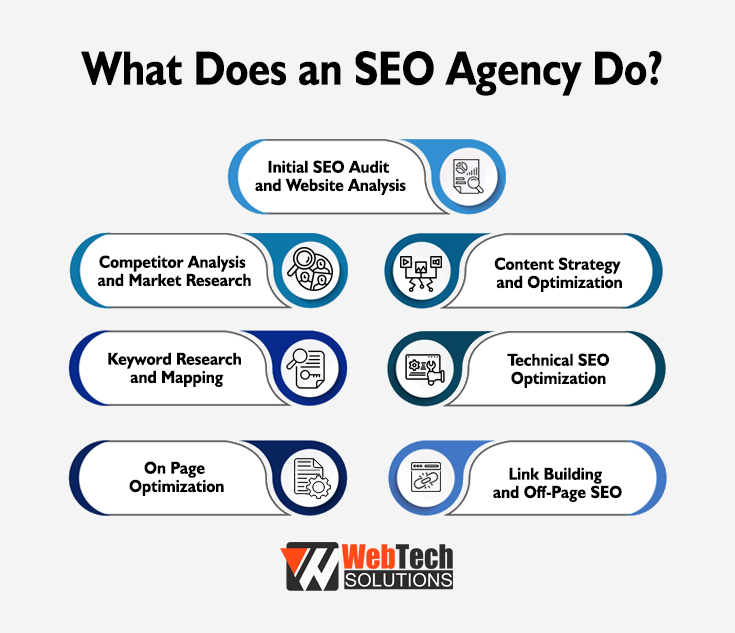
1. Website Audit and SEO Health Check
The very first thing an agency does is audit your website. This audit uncovers everything from broken links and slow loading pages to issues with mobile responsiveness and meta tags.
The audit gives a blueprint of what needs to be fixed and what’s already working.
2. Keyword Research and Mapping
Here is where the magic starts. Agencies analyze what people are searching for and match those queries with your services or products.
But it is not just about high search volume – it is about relevance and intent. They also map these keywords to specific pages, ensuring that every section of your site serves a purpose.
3. On Page SEO Optimization
This part focuses on everything visible and behind the scenes of your website pages. From optimizing title tags, headers, and images to improving internal linking and content structure, on-page SEO is all about making your website clearer and more relevant to both users and search engines.
4. Technical SEO Fixes
Your website might look great, but if it is technically flawed, search engines will ignore it. Technical SEO includes improving site speed, ensuring mobile friendliness, fixing crawl errors, and structuring your sitemap. An SEO agency will work closely with developers to get this right.
5. Content Strategy and Creation
Content is not king unless it is strategic. Agencies will help create a content calendar based on keyword opportunities, user interest, and competitor gaps. This includes blogs, landing pages, and sometimes even videos or interactive content.
6. Link Building and Authority Building
Google still uses backlinks as a major ranking signal. Agencies reach out to other reputable websites to secure quality backlinks. The aim? To make your site more authoritative in Google’s eyes.
7. Analytics, Tracking, and Reporting
All efforts are useless if you are not measuring them. SEO agencies set up tools like Google Analytics, Search Console, and advanced tracking platforms to monitor traffic, rankings, and user behavior. You will get reports that actually make sense, with real data on ROI.
Other Types of SEO Services Agencies Offer
An SEO agency does not offer just one size fits all services. They change their offerings based on your business goals, audience, and budget. Here is what you can expect:
- Local SEO: For businesses targeting a specific region or city, local SEO ensures your business appears in local search results, map packs, and directories. It is ideal for physical stores, service providers, and clinics.
- E-commerce SEO: Running an online store? E-commerce SEO focuses on optimizing product pages, category structures, and conversion flows. The goal is to attract qualified buyers and reduce cart abandonment.
- Enterprise SEO: Larger businesses with huge websites need enterprise level SEO. This involves managing thousands of pages, dealing with complex tech stacks, and often multiple websites or subdomains.
- SEO for Startups and Small Businesses: For those just starting out, agencies offer affordable and scalable solutions to help you grow steadily. This might include quick wins, budget content strategies, and local ranking tactics.
- Semantic SEO: If you want to cover broader and relevant topics, an SEO agency offers you Semantic SEO services to write fully customized SEO friendly content.
How an SEO Agency Builds a Full SEO Strategy?
Let’s be real – SEO is not just about sprinkling a few keywords here and there and hoping for the best. If you are aiming to compete in today’s digital world, you need a solid, well-thought-out SEO strategy. Think of it like building a house.
You need a foundation, framework, finishing touches, and regular maintenance. That’s how a complete SEO strategy works.
WebTech Solutions, the leading SEO agency in the United States, the United Kingdom, Spain, Pakistan, and Australia, creates a complete and comprehensive SEO strategy according to its clients’ requirements.
However, some steps are always similar, which assists in creating an effective SEO strategy. Below, I have mentioned them.
1. Initial SEO Audit and Website Analysis
Before anything else, an SEO agency shoul start with a thorough SEO audit. This helps understand where the website stands right now. Here is what this includes:
- Technical Audit: Checks the site’s health using tools like Screaming Frog, Ahrefs, or SEMrush. An SEO agency should at crawl errors, redirect loops, broken links, mobile responsiveness, and duplicate content.
- On Page Review: Evaluates title tags, meta descriptions, header tags (H1-H6), content structure, and keyword usage.
- Content Audit: Identifies low-quality, thin, or duplicate content. It also assesses whether the content matches search intent.
- Backlink Profile: Analyzes link quality, anchor text diversity, and spammy backlinks using tools like Ahrefs Backlink Checker or Moz.
- Core Web Vitals: Measures user experience metrics such as Largest Contentful Paint (LCP), First Input Delay (FID), and Cumulative Layout Shift (CLS).
The goal here is to find out what is broken, what is missing, and what can be improved.
2. Competitor Analysis and Market Research
Once the agency knows where the website stands, they get into analyzing competitors. This tells them what is working for the brand and how they can do it better.
- Keyword Gap Analysis: Helps discover keywords competitors rank for that you don’t.
- Backlink Analysis: Looks at their link sources and anchor strategies.
- Content Strategy Review: Examines the type of content they publish, their frequency, and engagement levels.
- SERP Feature Targeting: Identifies whether competitors are appearing in featured snippets, “People Also Ask” boxes, image packs, etc.
3. Keyword Research and Mapping
Next up is keyword research, which lays the foundation for both content and on-page optimization. Here is how an SEO agency goes about it:
- Search Intent: They categorize keywords into informational, navigational, transactional, and commercial investigation.
- Long Tail Keywords: These have lower competition and higher conversion potential. An SEO agency uses tools like Ubersuggest, Keyword Planner, and Semrush for this.
- Keyword Clustering: Groups related keywords to form pillar and cluster pages.
- Search Volume and Difficulty Balance: Targets low KD keywords and high volume keywords, as both are highly useful in grabbing more audience.
- Keyword Mapping: Assigns keywords to specific URLs to ensure no cannibalization and optimal targeting.
Proper keyword mapping is essential to avoid overlap and make each page work for a unique goal.
4. On Page Optimization
This is where the magic starts becoming visible. An SEO agency optimizes individual web pages to rank higher and earn more relevant traffic. Key tasks include:
- Title Tags and Meta Descriptions: The agency writes clear, keyword-rich titles and descriptions within Google’s character limits.
- URL Optimization: Clean, short URLs with relevant keywords (no messy parameters).
- Header Tags Structure: Using H1 for the title, followed by H2s and H3s for logical content flow.
- Keyword Placement: Naturally placing keywords in titles, headers, introductions, body text, image ALT tags for Image SEO, and conclusion.
- Internal Linking: Linking to related pages using contextual anchor text. This boosts SEO and improves site navigation.
- Schema Markup: Adds structured data for rich results. For example, adding Article, FAQ, Breadcrumb, and Product schemas.
Every on-page element is tuned to serve search engines and readers equally.
5. Content Strategy and Optimization
Now we get to the heart of SEO – content. Without valuable content, no SEO strategy can stand.
- Content Calendar: The SEO agency build a monthly or quarterly content plan based on keyword research and user needs.
- Content Formats: Mixes blogs, guides, how-tos, videos, infographics, and case studies.
- E-E-A-T Principles: Focuses on Experience, Expertise, Authoritativeness, and Trust. Google values well-sourced and authored content.
- Content Length and Structure: Based on competitors and topic depth. SEO agencies use short paragraphs, bullet points, and media to improve readability.
- Content Updates: Refreshes old posts with new data, images, and optimized keywords.
- User Intent Matching: Ensures the content truly addresses what users are looking for, not just what keywords they search.
The idea is to turn your site into a content hub for your niche.
6. Technical SEO Optimization
This is the backend work most people don’t see, but search engines love. In the under section, I have mentioned how an SEO agency, especially WebTech Solutions, deals with it.
- XML Sitemap and Robots.txt Setup: Helps crawlers understand and index your site properly.
- Mobile Optimization: Ensures responsive design and a smooth mobile experience.
- Page Speed Optimization: Compresses images, enables browser caching, and uses CDNs to load faster.
- HTTPS and SSL: Secures your site with SSL certificates.
- Canonical Tags: Prevents duplicate content issues by pointing to preferred URLs.
- JavaScript and CSS Optimization: Minimizes unused code and reduces render-blocking resources.
Technical SEO is like tuning your car engine. It doesn’t look fancy, but it determines how fast and far you go.
7. Link Building and Off-Page SEO
This part strengthens your domain authority and boosts your rankings across the board. An SEO agency specifically focuses on this aspect to make sure you can build a high authority website and maintain its worth.
- Backlink Acquisition: SEO agency aims for natural backlinks from high-authority, relevant sites.
- Guest Posting: Publishes value-driven articles on industry blogs with proper backlinks.
- Broken Link Building: Finds broken links on other sites and suggests your content as a replacement.
- Digital PR: Promotes your brand and content to journalists and bloggers for link mentions.
- Brand Mentions Monitoring: Turns unlinked mentions into backlinks.
- Anchor Text Diversity: Ensures a mix of branded, exact-match, partial-match, and generic anchor texts.
This entire process is iterative. SEO is not a one and done job – it requires ongoing tweaking, testing, and staying updated with algorithm changes. That’s why a successful SEO strategy feels less like a checklist and more like a roadmap you revisit again and again.
Is Hiring an SEO Agency Worth It?
Yes, hiring an SEO agency is worth the investment to grow your business and boost revenue, especially for those who lack expertise, time and resources. SEO agencies can drive organic traffic, increase website visibility, and ultimately boost sales and revenue.
Looking For a Professional SEO Agency
Webtech Solutions is your one-stop destination to Boost Your Online Business. Choosing WebTech Solutions means partnering with a team of experts dedicated to driving digital success for your business. With 12+ years of experience across various industries, we use advanced strategies in SEO, social media marketing, PPC, and content creation to deliver measurable results.
Benefits of Working with an SEO Agency v Managing SEO on Your Own
Here’s a comparison table that outlines the benefits of working with an SEO agency versus managing SEO on your own or without an agency:
| Factor | With an SEO Agency | Without an SEO Agency |
|---|---|---|
| Expertise & Knowledge | Access to professionals with in-depth SEO knowledge and experience | Limited knowledge or trial-and-error approach |
| Time & Effort | Agency handles all SEO tasks, saving you time | You invest significant time learning, applying, and optimizing |
| Customized Strategy | Tailored SEO strategies specific to your business goals | Generic, one-size-fits-all solutions often fail to meet specific needs |
| Technical SEO | Experts handle technical aspects like site structure, speed, and mobile-friendliness | May overlook technical issues like site speed, mobile optimization, or crawl errors |
| Content Creation & Optimization | High-quality, keyword-focused content created and optimized | You may struggle to produce optimized content that ranks well |
| On-Page SEO | Continuous optimization of meta tags, headers, and internal links | On-page optimization might be inconsistent or incomplete |
| Link Building | Professional link-building strategies to improve authority | Difficult to establish quality backlinks on your own |
| Ongoing Monitoring & Adjustments | Continuous monitoring, adjustments based on analytics, and trend analysis | You may miss important changes in algorithms or emerging SEO trends |
| Local SEO | Expertise in improving local search visibility (if relevant) | You may overlook important local SEO tactics or miss out on local opportunities |
| Results & Reporting | Clear, regular reporting with measurable results | Hard to track or measure success effectively without the right tools or expertise |
| Cost | Typically involves monthly charges or project-based fees | Free (but with significant time investment and potential missed opportunities) |
| Long-Term Growth | Focus on sustainable, long-term growth with a well-rounded strategy | Short-term fixes with potentially unsustainable results |
We have clearly outlined how hiring an SEO agency is beneficial. However, you can decide what you need to do according to your needs.
Final Thoughts
These are the details about what is SEO agency and how they can help you climb up the rankings in the SERP. At the end of the day, SEO is both an art and a science. It requires patience, strategy, and a deep understanding of how search engines think.
That’s exactly what a professional SEO agency brings to the table. Whether you are a business owner who is overwhelmed or someone trying to scale faster, working with an agency could be your smartest move. Remember, visibility is power, and SEO is how you earn it.

